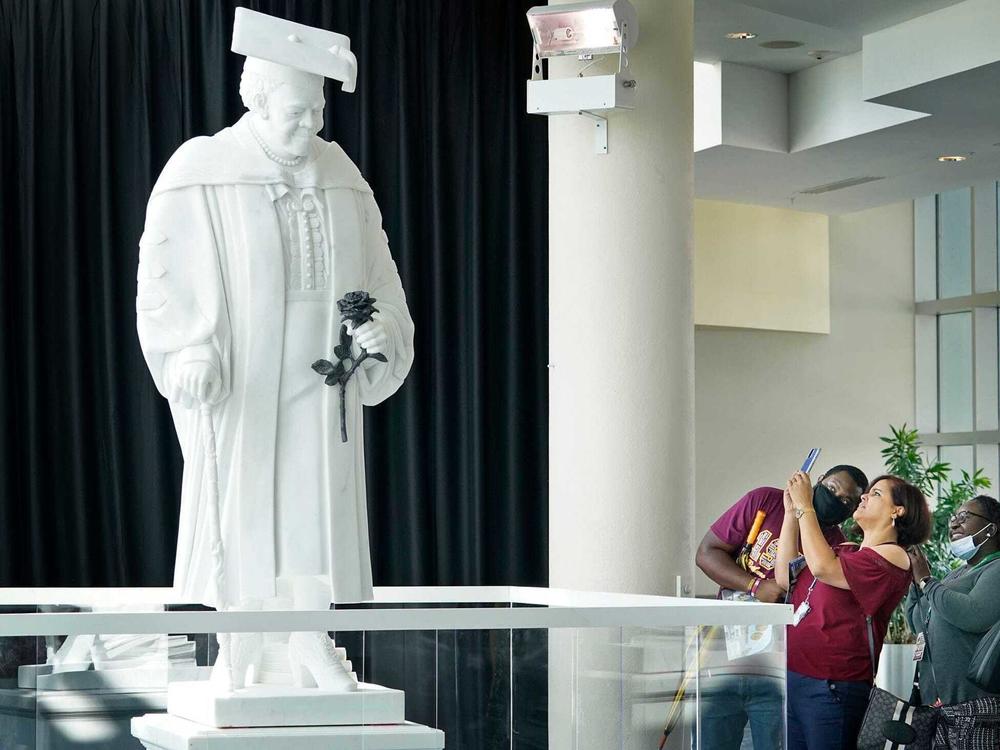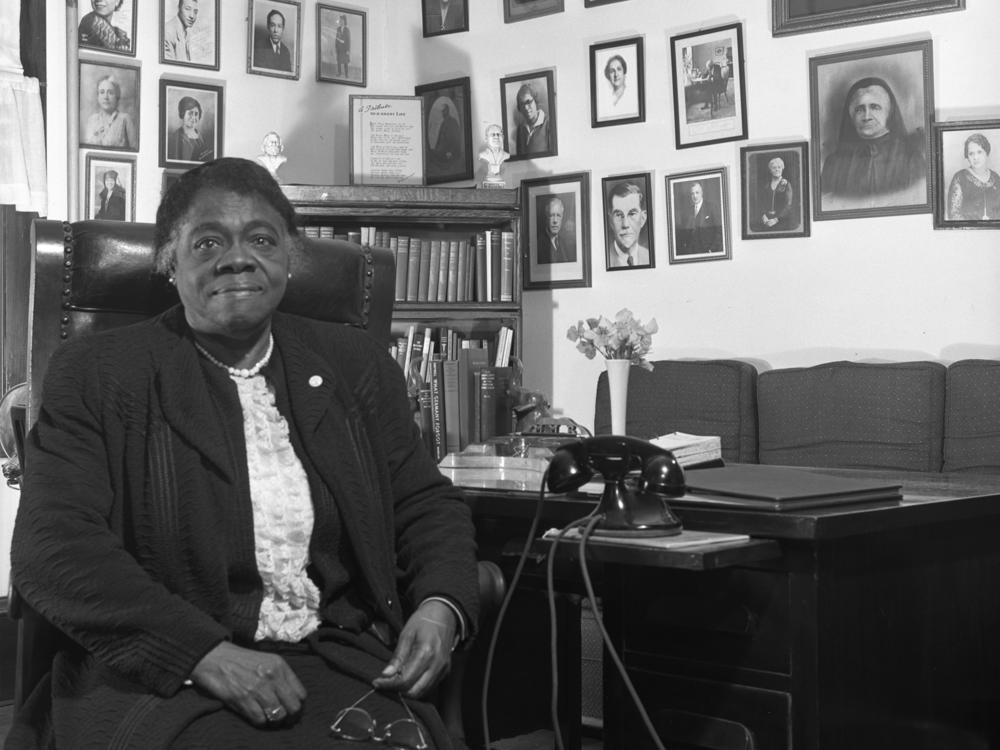Section Branding
Header Content
This statue of Mary McLeod Bethune will soon make history at the U.S. Capitol
Primary Content
Educator and civil rights activist Mary McLeod Bethune will soon make history as the first Black person to have a state-commissioned statue in the U.S. Capitol's Statuary Hall, when her statue replaces that of a Confederate general.
It's a milestone many years in the making. So what exactly will that groundbreaking statue look like?
Members of the public can now see for themselves, after the larger-than-life marble figure was unveiled in Bethune's home state of Florida earlier this week. It will remain on display in Daytona Beach for several months before taking its place in the nation's capital in early 2022, according to Florida Democratic U.S. Rep. Kathy Castor.
Bethune, the daughter of formerly enslaved people, was an influential educator and activist who — among her many accomplishments — founded the National Council of Negro Women, advised multiple U.S. presidents and created a boarding school for Black children that would later become Bethune-Cookman University in Daytona Beach.
The 11-foot statue, which weighs more than 6,000 lbs., was sculpted out of the largest (and last) piece of statuary marble from Michelangelo's quarry in Italy. It was created by artist Nilda Comas, who was chosen from a field of 1,600 applicants and is the first Hispanic master sculptor to create a statue for the National Statuary Hall State Collection.
Floridians can see the statue in person and learn more about Bethune's life at a free exhibit that will be held at Daytona State College's News-Journal Center through early December.
"Dr. Bethune embodies the very best of the Sunshine State. Floridians and all Americans can take great pride in being represented by the great educator and civil rights icon," Castor said. "I am glad that she is being rightfully recognized here in Florida before she travels to her place of honor and recognition by all of America in the U.S. Capitol."
A symbolic statue for an American icon
With a subject and sculptor secured, the creation of the actual statue involved significant fundraising and research efforts.
The Dr. Mary McLeod Bethune Project has spent years raising private funds for a marble statue for the Capitol, as well as another statue for a local park, a feature-length documentary and a K-12 curriculum module.
Bob Lloyd, the fund's board treasurer, told CNN that the nonprofit had raised about $800,000 in private donations. That money went toward the marble statue and a bronze replica that's been slated for a new riverfront park in Daytona Beach.
Before she started sculpting, Comas conducted intensive research at state and national archives, the State of Florida Archives and Bethune-Cookman University.
At Monday's unveiling, she called the four-year process "a beautiful journey."
"I just fell in love with Dr. Bethune and everything that she did," Comas said, according to Orlando NBC affiliate WESH.
The statue depicts Bethune wearing a cap and gown and a pearl necklace, holding a black rose in one hand and a walking stick in the other. She's standing in front of a stack of books, with a warm smile and what one local reporter described as eyes that "capture wisdom [and] kindness."
The base of the pedestal is inscribed with her name, her home state, birth and death dates, as well as one of her most famous quotes: "Invest in the human soul. Who knows, it may be a diamond in the rough."
These symbols each speak to an element of Bethune's life and legacy, the nonprofit explains.
The cap and gown represent her lifelong commitment to education, and the stack of books symbolizes her focus on expanding education for women and people of color specifically. The spines bear words from her one of her famous writings, her last will and testament: love, faith, racial dignity, courage, peace and "a thirst for education."
Bethune collected walking sticks during her lifetime, reportedly seeing them as symbols of refinement and leadership. The walking stick depicted in the statue is modeled after a gift she received from President Franklin Roosevelt, with whom she worked closely. He appointed her to the National Youth Administration in 1936, became the organization's director of Negro affairs and served as the only female member of Roosevelt's "Black Cabinet."
The black rose represents Bethune's work in education, as well as her belief that "loving thy neighbor" required interracial, inter-religious and international brotherhood, according to the nonprofit.
"Although there is no species of flower called a 'black rose,' Dr. Bethune was captivated by beauty of a rose with a particular dark hue," it explained. "These dark roses instantly became her favorite. She thereafter referred to her pupils as her 'black roses.' "
History many years in the making
The Capitol's Statuary Hall collection features two statues from each of the 50 states.
Florida first moved to replace one of its statues, honoring Confederate General Edmund Kirby Smith, in 2016. It was removed from the Capitol just last month.
State lawmakers unanimously approved Bethune as its replacement in 2018, after after a lengthy search process that included input from members of the public.
Florida Gov. Ron DeSantis officially requested in 2019 — on the 144th anniversary of Bethune's birthday — that she represent Florida in the national statue collection.
"Dr. Bethune takes the place of an obscure Confederate general who has represented Florida in the state collection since 1922 and will be one of only a few women to represent a state in the 100-statue collection," Castor said.
Florida is not the only state to make such a change. Virginia is replacing its statue of the Confederate General Robert E. Lee with civil rights icon Barbara Johns, and there are ongoing efforts by some lawmakers to increase the number of women represented in the Capitol and remove Confederate statues from display.
There are just four other Black Americans represented in statues throughout the Capitol (and about a dozen others in paintings and murals): Frederick Douglass, Rosa Parks, Sojourner Truth and Dr. Martin Luther King Jr.
Copyright 2021 NPR. To see more, visit https://www.npr.org.


